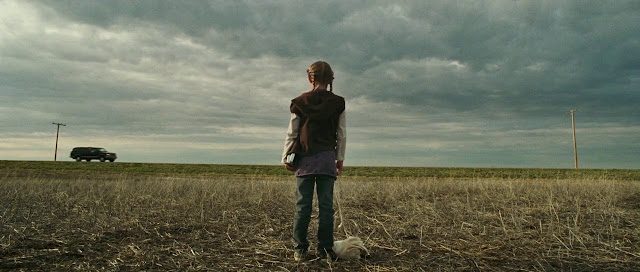From its deeply unsettling opening scene in which the two sleeping occupants of a lonely motel are brutally murdered by masked intruders, to its stark, haunting denouement, Surveillance is a taut and twisted piece of nightmare cinema. Directed by Jennifer Lynch and co-written by Lynch and Kent Harper, it tells of two FBI agents (Julia Ormond and Bill Pullman) who arrive at a remote police station to interview the three survivors of a horrific roadside massacre, whose contradictory statements offer fragmented recollections of the same harrowing incident. As tensions mount during the interviews, and the events of what happened are slowly pieced together, it soon becomes clear that not everyone is telling the truth, and not everyone is who they appear to be…
Lynch collaborated with cinematographer Peter Wunstorf, who
used different film stocks when filming the survivors’ flashbacks and
recollections of the same incident. The flashbacks of the angry cop (co-writer
Kent Harper) are rendered in dreary sepia to not only convey his boredom and
nonchalance but reflect how he sees himself as a John Wayne-inspired rebel in
the middle of nowhere. Addict Bobbi’s (Pell James) POV of events are highly
saturated to express her drug-induced perspective, while the young girl,
Stephanie (Ryan Simpkins), remarkably perceptive for her age, sees and
remembers everything clearly and without hidden motive or agenda. While the use
of three different film stocks sounds jarring, Lynch’s execution of this
approach is subtle enough to not distract or pull the viewer out of the story. Many
of the characters are flawed and even unsympathetic, none are clear cut ‘good’
or ‘bad’. As the story unravels and more of what happened at the side of the
road becomes clear, layers are striped back and new elements emerge from each
character. The contrast of the complex interior workings of the characters with
the wide-open landscapes in which the violent events unfold, creates such a
striking and discomfiting dichotomy.
15 years after her directorial debut, Lynch’s ‘comeback’ marks her as a filmmaker still fascinated with the darker side of human nature and what drives individuals to commit depraved acts of violence and cruelty. While Boxing Helena (1993) was a darkly twisted, sensational fairy tale about obsession and will, Surveillance is a stark, warped and harrowing tale concerned with ideas of perception, memory and comprehension, and a truly haunting exploration of the nature of evil.

